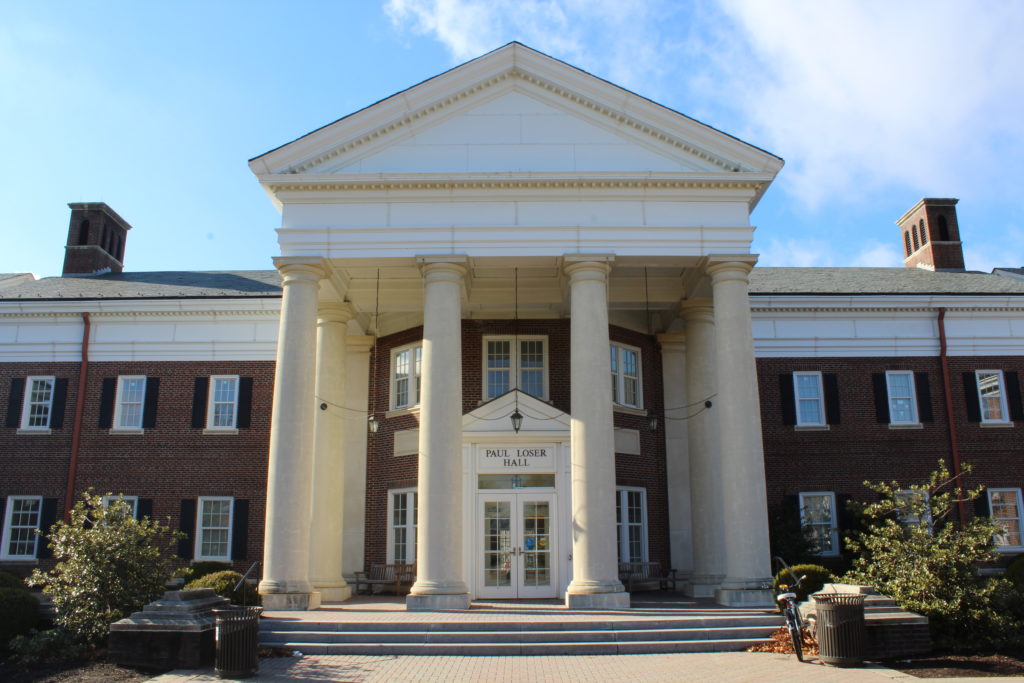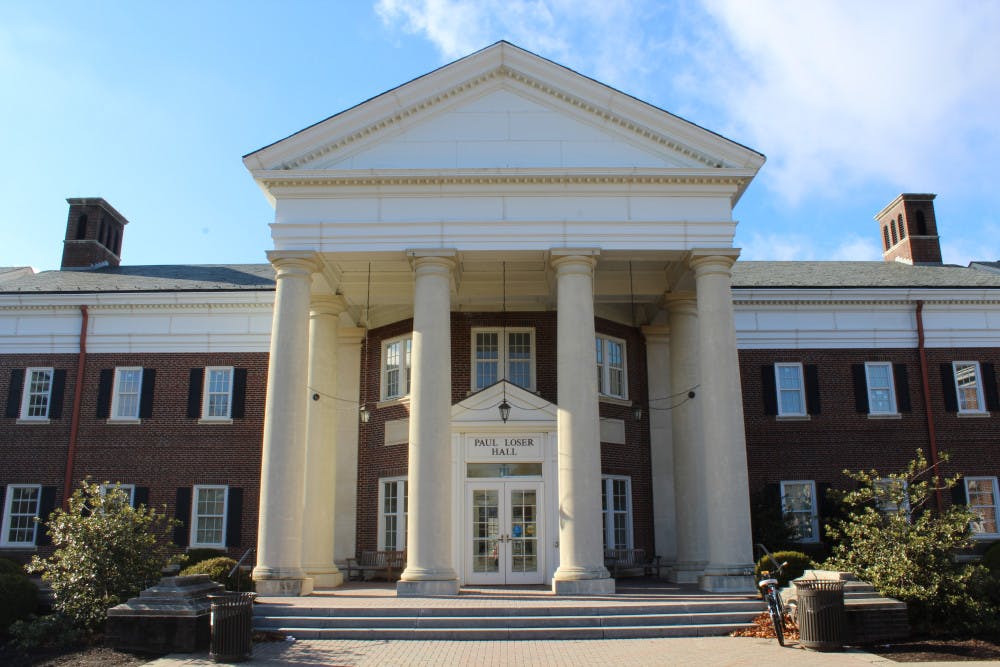By Heidi Cho
News Assistant
There was no disrespect. No overlap. No arguing. The only exception was when two people accidentally spoke over each other, and both apologized in turns in rapid succession.
The words were powerful and the people were opinionated, but every view and person was more than respected — everyone was heard.
In these self-regulated conditions, the Advisory Commission on Social Justice held an open forum on Thursday, April 13, in the Library Auditorium. Students were able to discuss the implications of naming the College’s admission building, Paul Loser Hall, after a segregationist.
The discussion quickly evolved to focus on the College’s image and role within the Trenton, N.J., community, with a few students agreeing the name change would be an empty gesture to the College’s neighbors.
The two forum moderators first displayed and handed out copies of the Trenton Times article from October 1943 and letter penned by a mother of students in the Trenton school system that made the College reconsider the name of Loser Hall.

Paul Loser was said to have “dragged his feet” in the court-approved lawful desegregation of two black students into a whites only school, according to Kevin Moncayo, one of this forum’s moderators and a senior psychology and history double major.
The history behind the naming was further clarified by John P. Donohue, the vice president of College Advancement. Tom Loser donated $1 million to the College and wanted no recompense, according to Donohue. At the College’s insistence, Tom basically said if you have to name something after me, name it after my father, Paul, who was an educator, specifically a superintendent.
“There was no economic incentive to not change or change the name of Loser Hall,” Donohue said.
The decision, if not about money, “should be a no-brainer,” according to Andrew Holt, a sophomore mechanical engineering major who experienced Trenton’s education system first-hand.
Mark Scott, a sophomore open options major who was a student in Trenton’s public school system, also questioned the value in a name change.
“Where does changing the name help my community?’ Scott asked.
The focus should be on what else the College can do for its local communities, according to Hold.
“This is like one smidgen of a very huge, bigger problem,” Holt said.
This debate deals with what role the College plays in Trenton and the implications of that role or if it even impacts the citizens of Trenton at all.
Each student has to participate in eight hours of service in first-year community engaged learning, or CEL, days.
Holt shared what influence CEL days had on Trenton’s public school system. He lives 12 to 15 minutes away from the College.
“I didn’t really see much of a presence at all from TCNJ, and as everyone stated, the presence I did see was like the forced like ‘Ugh, I have to be here.’ Like I knew that these kids were here because they had to be here,” Holt said.
“This was the closest college, but it was yet the furthest college away from me,” Holt added.
Holt said he felt many other students from Trenton shared that same sentiment.
Victoria Guerra, a sophomore nursing major and a Bonner scholar, agrees there is a sense of frustration and forced resentment around CEL days.
“It is very frustrating to do service that provides an apolitical means to try to solve, not even solve, but try to contribute effectively to conditions that have been very much politically produced,” Guerra said.
Guerra also asked how the College will avoid gentrification and a savior complex while helping the community.
Chris Loos, a sophomore history major in the audience, felt that the College has already taken actions that connote a patronizing nature symptomatic of a savior complex.
“Community service… almost has the sort of sense of a top-down approach, where we, the people from TCNJ, nobly come into Trenton and solve all the problems,” Loos said.
“Instead of describing reform, (there should be) focus on cooperation with the community of Trenton, fostering growth from the ground up, working with them, taking care not to gentrify,” he added.
[slideshow_deploy id='52287']
Similarly, the TCNJ Clinic is another tie to the Ewing, N.J., and Trenton communities.
“The affordability and quality mental health services that the TCNJ Clinic offers is invaluable to the Ewing, Trenton and nearby communities,” Moncayo said.
The TCNJ Clinic is scheduled to close at the end of the 2016-17 academic year.
These ties between the College and the Trenton community are underwhelming at best, according to Tim Osborn, a senior physics major. He questioned what progress can be made on a shaky foundation where the TCNJ Clinic is closing and CEL days are surrounded by an atmosphere of force.
“If you can’t hold steady ground, how can you start to improve?” Osborn asked.
Throughout the discussion, questions like these probed the deeper issues plaguing the conflict between the role the College perceives itself to have and what it really does in Trenton.
The majority of the intense hour and 30 minutes delved into what Christopher Fisher, an associate professor of history and member of the TCNJ Committee on Social Justice, called “an existential question.”
“We don’t know who we are as an institution,” Fisher said. This stems from the College not knowing itself well enough to know how to engage with Trenton, according to Fisher.
“This is about our identity, answering these questions and bridging these connections with Trenton,” Fisher said.
The way the College markets itself only further convolutes and contradicts the liberal learning environment it claims to have.
“The College needs to drastically change the way it markets itself,” Osborn said.
“It is marketed as a school for upper middle-class white people, by middle-class white people, with a sole purpose to upper middle-class white people. And I think when you have that mindset, when your student body looks like that and your study body thinks like that, and that’s all they care about, you are naturally going to create a populace that doesn’t think these issues are important,” Osborn added.
Sarah Bennett, one of the forum’s moderators and a sophomore elementary education and English double major, believes she was tricked by the College’s marketing. “I was thinking of TCNJ kind of using their minority students in flyers, students and videos, and you get on campus thinking like ‘Where’s that girl from the video?’” Bennett said.
Fisher perceives a similar lack of diversity among faculty.
“Look for the number of African American men on campus. I wanna bet maybe five,” Fisher said. “And of those five, I’m probably the second oldest here. Now that’s a problem.”
While Fisher talked about the lack of racial diversity among professors and faculty, students like Scott and Guerra see a reversed version of the same problem in the on-campus staff.
“When all the Eick managers gather together, and they have a meeting, there is not one black face in that crowd. There’s about four to five people and they are all white,” Scott said.
Guerra ran into an old friend from the Trenton school system while in line at Quimby’s, except her friend was on the other side serving food.
“Being from Trenton, it is incredibly confusing to be served by someone I’ve been to high school with and understand that they do not have the investment and the resources available for them to actually go to college,” Guerra said.
The core issue is the same. These students perceive a lack of diversity that does not naturally lend itself to fostering the discussions that either of these students were hoping for.
“The College needs to market itself as a place for these conversations,” Osborn said.
Fisher agrees that discussions like these are what differentiates “a college from a trade school or a technical school.”
“They train you basically to work at a job. We train you to be leaders and to be citizens. That requires more from you than just knowing your major,” Fisher said.
This forum made students, faculty and staff reevaluate itself and its place in Trenton’s community, and it asked students to know what they paid for and why they chose to come here.
“It’s a conversation I don’t think we have in TCNJ. Why the hell are you here?” Fisher said.







